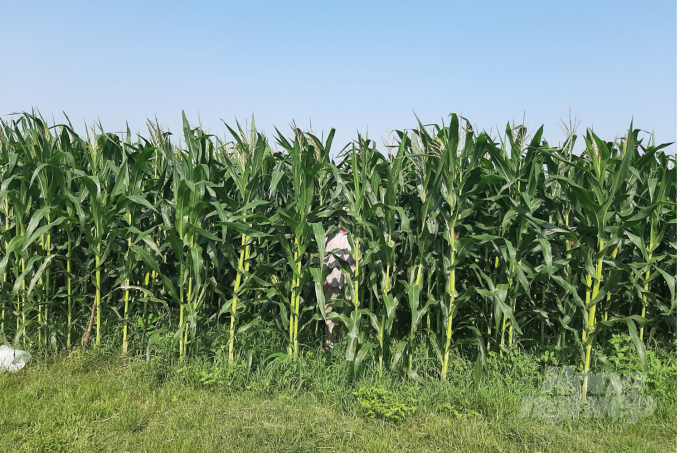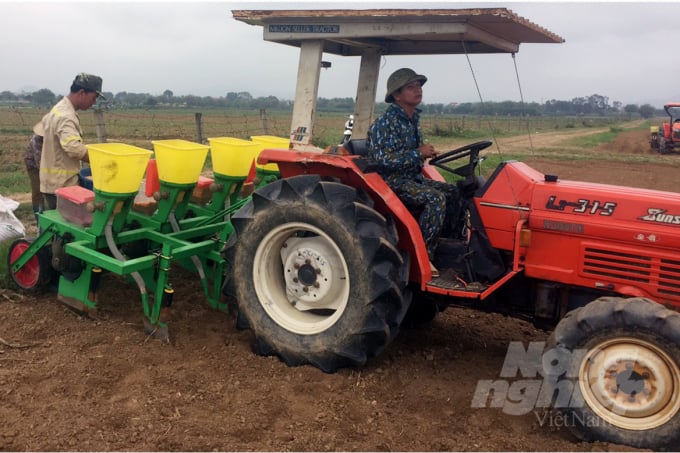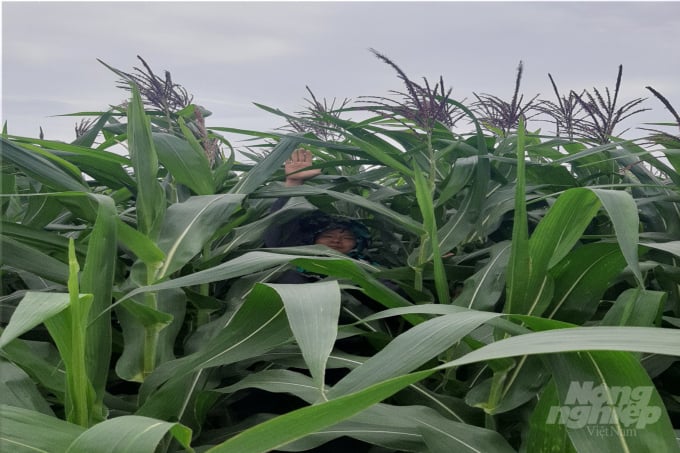May 19, 2025 | 23:24 GMT +7
May 19, 2025 | 23:24 GMT +7
Hotline: 0913.378.918
May 19, 2025 | 23:24 GMT +7
Hotline: 0913.378.918

Using bio-products to grow biomass corn helps plants grow well, reducing many disease objects. Photo: VD.
In the spring-summer crop of 2021, BiOWiSH Vietnam coordinates with farmers of Quyet Thang hamlet, Thieu Thinh commune, Thieu Hoa district (Thanh Hoa province) to plant a pilot model of 12 hectares of biomass maize.
The model used maize variety VN172 picked by the Institue. During the farming and caring, Thieu Thinh farmers used probiotics provided by BiOWiSH Vietnam.
Until now, after over 90 days of sowing, the maize plants have entered the milk-waxed phase, firm seeds, and ready to harvest. According to Thieu Thinh farmers, the yield is estimated at 2.7-2.8 tons/rod (500 m2). All products will be purchased by the representative of BiOWiSH Vietnam Biotechnology Joint Stock Company in Thanh Hoa to supply dairy companies.
Nguyen Quoc Hung, from Quyet Thang hamlet, said that before making soil, he used mineral-organic biological products supplied by BiOWiSH Vietnam Biotechnology Joint Stock Company to fertilize the soil.
After that, he used other biological fertilizers including NPK Bio, Ure Bio, Kali Bio, Lan Bio to fertilize and top up according to the instructions. These are chemical fertilizers containing biological products to help the plant grows fast and enhance the resistance against pests and diseases.

Mechanization in growing biomass corn helps to increase economic efficiency per unit area. Photo: VD.
“We grow 11 hectares of maize VN 172, so far it is ripe enough to be harvested, the yield is estimated at 54-56 tons per hectare, which is 8-10 tons per hectare, higher than the maize varieties I used to grow previously. This is a maize variety that features good resistance to pests and diseases and is very suitable for alluvial soils. If using probiotics to grow VN 172 maize, it creates a profit of VND 22-25 million per hectare per crop,” Hung said.
Hung added that, in addition to biological products and bio-fertilizers provided by BiOWiSH Vietnam Biotechnology Joint Stock Company, he did not apply manure, however, the yield was still higher than expected. The strong wind in recent days caused many maize fields to fall, but VN 172 still remains unharmed.

The yield of maize variety VN 172 using bio-products for growing biomass maize increased by 8-10 tons compared to other maize varieties. Photo: VD.
A representative of BiOWiSH Vietnam Biotechnology Joint Stock Company said that when implementing this model, the company wants to transfer the technique of growing biomass maize in a large field according to the US technology, mechanizing the whole process.
The results showed that the yield and quality when using probiotics and BiO fertilizers gave outstanding yield and quality. In the coming time, the company will expand its area and cooperate with farmers to provide biomass maize for dairy companies.
Maize VN 172 was selected and bred by the Maize Research Institute and has been recognized as a national variety. Each hectare of maize uses 22-26 kg of seed. VN 172 maize is suitable for growing biomass maize, the growing period of the spring-summer crop is 90 days, other crops are 110 days.
The process of fertilizing and using bio-products to grow biomass maize
A representative of BiOWiSH Vietnam Biotechnology Joint Stock Company said that before sowing seeds, farmers need to apply probiotics; fertilizing 801 Kg/ha NPK according to the rate of 5-10-3. When maize plants 3-4 leaves, farmers apply the first application of NPK (12-5-10) 453 kg/ha in combination with breaking down and dressing fertilizer for the second time with the same amount of when the maize plant has 9-10 leaves, combined with high cultivation, fall-resistance and applying 10 kg/ha URE.

(VAN) Minister of Agriculture and Environment Do Duc Duy held a meeting with Soopakij Chearavanont, Chairman of C.P. Group, on May 15.
/2025/05/16/3800-0-nongnghiep-143756.jpg)
(VAN) Suntory PepsiCo Vietnam coordinated with the Ministry of Education and Training to implement an education program on water conservation, reaching nearly 1 million primary school students nationwide.

(VAN) Vietnam’s TH Group officially put its high-tech fresh milk processing plant into operation in the Russian Federation, marking a historic moment as the first TH true MILK cartons were produced in Russia.

(VAN) Use of high-quality broodstock and biotechnology is regarded as the most effective approach to ensuring sustainable and economically viable shrimp aquaculture ahead of climate change and the emergence of increasingly intricate disease patterns.

(VAN) Carbon farming is a form of agricultural practices that helps absorb more greenhouse gases than it emits, through smart management of soil, crops, and livestock.

(VAN) This is a key content of the Memorandum of Understanding recently signed between the Vietnam Fisheries Society and Kunihiro Inc of Japan.

(VAN) To achieve the goal, local authorities and businesses in Kon Tum province have fully prepared the necessary conditions for the new Ngoc Linh ginseng planting season.